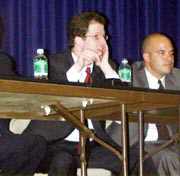Union City property owners may see a slight tax decrease in their tax bills this year, said Union City Mayor Brian Stack after the Board of Commissioners meeting held Tuesday.
The board approved an approximately $37.3 million tax levy at the meeting, which is approximately $500,000 lower that last year’s levy. Last year’s tax levy was set at $37.8 million.
The levy is the portion of the city budget that must be funded by taxes. The city has not yet introduced its total budget. Last year’s was $73.15 million.
The fiscal year 2003 budget will runs from July 1, 2002 to June 30, 2003.
Showing a decrease
After showing a $70 tax decrease in the fourth quarter tax bill of the 2000-2001 fiscal year, Stack stabilized the tax rate in the 2001-2002 fiscal year, keeping taxes at exactly the same rate as the previous year.
However, this year, property owners in Union City will once again receive a much needed decrease in their taxes.
The decrease will show up differently for landlords who qualify for the REAP (Regional Efficiency Aid Program) credit on their tax bill. The REAP credit was given to Union City by the state after the city regionalized their fire department. Landlords who live in their building and own a dwelling of up to four families or an apartment building that is strictly residential qualify for REAP credit. The landlord also had to have owned the building since October of the year before to qualify for the credit.
In the first and second quarter tax bills last year, taxpayers who qualified for the REAP credit owed $1,027.25 per $100,000 assessed value per quarter. With the new tax levy, these homeowners will pay approximately $1,015 in each of the first two quarters. Last year, taxpayers receiving the REAP credit owed $1,016 on each $100,000 of assessed value for the third and fourth quarter tax bills. With the new tax levy, those taxpayers will be paying $1,023. These new rates will add up to a $47.92 decrease in taxes for every $100,000 worth or property over the year.
The taxpayer who did not qualify for the REAP credit paid $1,123.88 each of the four quarters last year on $100,000 of property. With the new tax levy, these property owners will pay $1.095.15 in the first two quarters and $1,106.71 in the third and fourth quarters. These taxpayers will see a total $91.80 decrease in the tax bill.
According to Stack, the REAP credit becomes lower depending on the number of people applying for the credit. Each municipality is allotted one total sum from the state for REAP credits. This amount is then divided by the number of people who qualify for the credit.
"More and more people are applying for the credit," said Stack. "In the beginning the number of people was small. Now more people are catching on."
According to Joseph Stancati, the deputy tax assessor for the City of Union City, the average one-family home in Union City is assessed at $125,000. The average two-family home in Union City is assessed at $175,000.
"[These averages] are based on a broad spectrum of numbers," said Stancati, adding that some one-family homes have been assessed at more than $200,000 and some of the newer two-family homes have been assessed at more than $400,000. "The assessment also depends on the condition and location of the homes," he said.
Sound fiscal planning
According to Stack, the decrease in taxes anticipated for the current fiscal year is a result of a combination of several factors.
Stack said that the Board of Commissioners has been able to keep a strong hold on city spending. According to Stack, the city has also seen $30 million in new ratables, which are taxable properties, come into the city.
"A lot of these ratables are a direct result of the amount of new development taking place throughout the city," said Stack.
The city sold five city-owned properties at an auction last Friday, raising more than $900,000. These five properties, because they were owned by the city, were not previously on the city’s tax roll. Since the sale, these properties have been placed on the tax roll, and the city can begin collecting taxes on them.
The five properties sold were 809 Central Ave., a former night club that has been vacant for more than 10 years; 723 32nd St., a commercial building with one vacant apartment; 211 40th St., a six-unit apartment building; 2031 Bergenline Ave., a non-occupied six-unit building; and 612 Third St, an empty lot.
Other steps were also taken at the board meeting to show that Union City is on the right track toward stabilizing finances.
An ordinance was passed allowing the city to increase its spending one percent more than the 5 percent already allowed by the state.
"We don’t think that we will need to use that extra one percent," explained Stack at the meeting. "But we are taking this measure just in case. This is responsible fiscal planning."
Stack said that it is unlikely that the city will even increase spending by the 5 percent allowed by the state.
